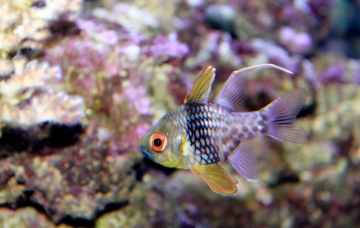Pajama_cardinal_fish_Sphaeramia_nematoptera_360 px width.jpg

Pajama cardinalfish were thought to be monogamous, but have recently been found to mate with other individuals when the opportunity arises. Credit: Brian Gratwicke, CC BY 2.0.
Many marine creatures are monogamous, from butterflyfish and French angelfish to mantis shrimp and seahorses. But even monogamous species may have a wandering eye at times. That seems to be true for the pajama cardinalfish, a small coral reef fish found throughout the western Pacific Ocean. It’s best known for the males storing fertilized eggs in their mouth until the offspring are ready to leave. These fish are typically thought to mate in pairs for life, but researchers discovered after two years of study in Papua New Guinea that both male and female pajama cardinalfish periodically take opportunities to mate outside their pair.
The scientists analyzed 105 broods from 64 males and found that nearly a third of the broods had been mothered by a female fish different from his partner. Even more interestingly, 11% of the broods had eggs from two different females, and more than 7% of them had eggs fertilized by two different males.
What makes these findings so surprising is the energy these fish devote to ensuring their offspring’s survival. Most monogamous fish that invest energy in parenting activities after mating—such as protecting the brood in the male’s mouth—would want the fish they watch over to be their own offspring, ensuring the continuation of their genetic line. This seems particularly sensible given the sacrifice these males make—they cannot eat and their swimming is impaired while they store their brood. Apparently, though, freeing up the female to produce more eggs leaves her enough extra eggs to offer to other males. The males, on the other hand, may eat some of the eggs if they need sustenance, thereby freeing up some room to accept more eggs from other females.


